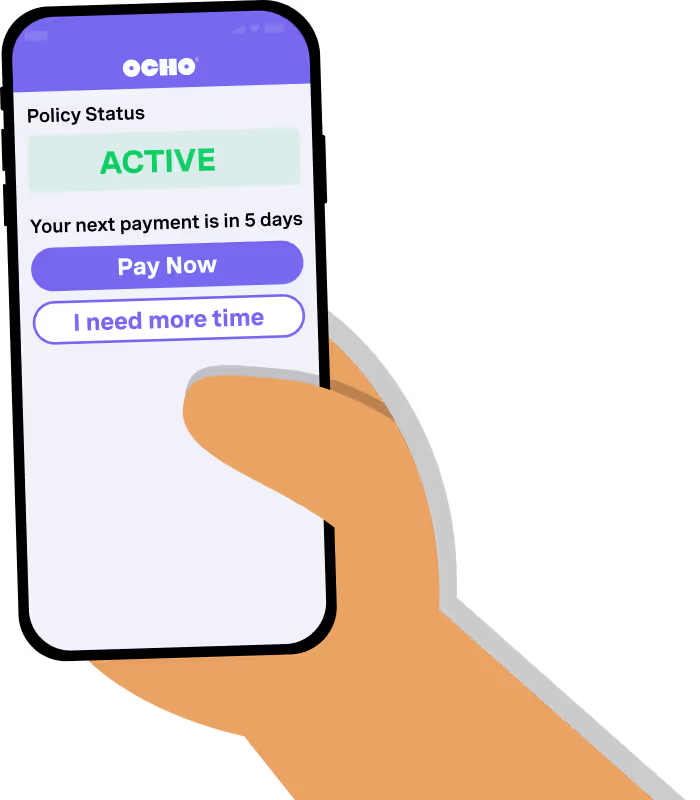
Getting car insurance without a driver's license might seem impossible, but there are several legitimate situations where you might need this coverage. While it's less common, many insurance companies, including OCHO, offer solutions for unlicensed individuals who need to insure a vehicle.
The key is understanding when and why you might need insurance without a license, and what options are available. From family situations to medical conditions, there are various scenarios where unlicensed individuals might need to maintain car insurance coverage.
Explore your coverage options with OCHO today.
Common Situations Requiring Insurance Without a License
Principal Driver Arrangements One of the most common scenarios involves listing someone else as the principal driver while maintaining ownership of the vehicle. This might apply if you:
Medical Conditions Some people lose their license temporarily or permanently due to medical conditions but still need to maintain insurance on their vehicle. Common situations include:
In these cases, liability coverage and other insurance options remain important for protecting your assets, even if you're not the one driving.
Collector Car Situations Classic car collectors or investors might need insurance for vehicles they own but don't drive. These situations often require specialized coverage that focuses on:
The process of obtaining car insurance without a license differs significantly from standard applications, but understanding the requirements can help streamline your experience. Insurance companies typically require more extensive documentation when working with unlicensed policyholders, as they need to verify both the vehicle ownership and the designated primary driver's credentials.
When applying for insurance without a license, you'll need to provide proof of vehicle ownership through registration documents or title papers. A valid state ID or other government identification can serve as your personal identification, even without a driver's license. The insurance company will also need detailed information about the primary driver who will be operating the vehicle.
Get affordable coverage with flexible payment options →
The person you designate as the primary driver must meet specific criteria to ensure proper coverage. They should possess a valid driver's license and, ideally, maintain a clean driving record. Insurance companies typically require this person to reside at the same address where the vehicle is registered, as this helps establish regular access and use of the vehicle. Your insurance rates may vary based on the primary driver's history and credentials.
Suspended license situations present unique challenges but don't automatically disqualify you from obtaining insurance. In fact, maintaining insurance coverage might be mandatory even with a suspended license, particularly if you need to meet SR-22 requirements or protect a financed vehicle. Many states require continuous insurance coverage to maintain vehicle registration, regardless of license status.
For vehicles that won't be driven, comprehensive-only coverage offers protection against non-driving related incidents such as theft, vandalism, and natural disasters. This type of coverage, sometimes called storage insurance, proves particularly valuable for collector cars or vehicles in long-term storage.
International license holders face their own set of considerations. Foreign nationals and international students often need insurance while navigating the process of transferring licenses, processing visa requirements, or establishing residency. Insurance companies understand these transitional periods and can typically provide coverage solutions while international drivers work through the licensing process.

Special Circumstances and Alternative Solutions
Navigating insurance requirements without a license often requires creative yet legitimate solutions tailored to specific situations. Senior citizens who voluntarily surrender their licenses due to age-related concerns represent a growing demographic needing specialized insurance arrangements. These individuals often maintain vehicle ownership to preserve independence through family drivers or hired services, requiring insurance that protects their assets while acknowledging their non-driving status.
Business-related scenarios present another complex dimension of unlicensed vehicle ownership. Small business owners might need to insure company vehicles despite not personally driving them. This situation commonly arises in delivery services, construction companies, or family businesses where the owner manages the fleet but relies on licensed employees for vehicle operation. Understanding coverage requirements becomes crucial to protect both business assets and liability concerns.
Temporary licensing gaps also warrant consideration. Individuals relocating between states might experience periods without a valid license while transferring credentials. Military personnel returning from overseas assignments, international professionals establishing U.S. residency, and students transitioning between jurisdictions often face similar challenges. These situations require insurance solutions that bridge the gap without compromising coverage.
Medical rehabilitation cases present particularly nuanced scenarios. Individuals recovering from serious injuries or medical procedures might temporarily lose their licenses while maintaining a reasonable expectation of returning to driving. Their insurance needs often evolve through different stages: from full coverage during active driving periods to modified coverage during recovery, and back to standard policies upon reinstatement. Insurance providers must demonstrate flexibility in adjusting coverage types and primary drivers throughout this progression.
The rise of vehicle sharing within families and communities has created new insurance scenarios for unlicensed vehicle owners. Shared vehicle arrangements, whether formal or informal, require careful consideration of coverage options and named drivers. These situations often benefit from specialized policies that accommodate multiple drivers while maintaining clear ownership and insurance responsibility structures.
Additionally, vehicle collectors and enthusiasts who maintain cars primarily for show or investment purposes represent a unique category of unlicensed owners. Their insurance needs focus more on asset protection and transportation coverage than traditional driving-related risks. These specialized policies might include coverage for vehicle transport to shows or auctions, storage at various locations, and protection during maintenance or restoration work.
The type of insurance available to unlicensed individuals often depends on the specific circumstances and intended use of the vehicle. For vehicles being actively driven by a designated primary driver, full coverage options remain available, including liability, collision, and comprehensive coverage. This ensures the same level of protection as standard insurance policies, despite the policyholder's unlicensed status.
Find the right coverage for your situation.
Parked car situations typically require a modified approach to coverage. While traditional policies assume regular vehicle operation, storage policies focus on protecting the vehicle from stationary risks. These policies can be especially cost-effective since they exclude driving-related coverages that aren't needed for stored vehicles. However, it's crucial to understand that storage policies don't provide any coverage if the vehicle is driven, even in emergencies.
Cost considerations vary significantly based on several factors. Insurance companies evaluate the primary driver's history and credentials, the vehicle's location and intended use, and the type of coverage selected. While some situations might result in higher premiums due to the unusual circumstances, others – particularly storage-only scenarios – often cost less than standard policies.
State requirements add another layer of complexity to insuring a vehicle without a license. Each state maintains different regulations regarding vehicle registration, insurance requirements, and owner responsibilities. Some states require the vehicle owner to have a valid license to register a vehicle, while others focus solely on ensuring proper insurance coverage regardless of the owner's license status.
Family situations often present unique opportunities for coverage. Parents of teenage drivers, for example, might maintain ownership and insurance on a vehicle primarily driven by their licensed child. Similarly, elderly individuals who can no longer drive might keep their vehicles insured for use by family caregivers. These arrangements typically require listing all potential drivers on the policy and designating a primary operator with a valid license.
Maintaining proper insurance documentation becomes especially important when the policyholder doesn't have a license. Keep detailed records of all primary drivers, their license status, and any changes to vehicle usage or storage conditions. This documentation proves invaluable if you need to file a claim or demonstrate compliance with state requirements.
Insurance providers like OCHO understand that circumstances requiring car insurance without a license are often temporary. Whether you're working toward obtaining a license, recovering from medical issues, or managing a vehicle for family use, flexible coverage options can adapt to your changing situation. Understanding car insurance basics helps you make informed decisions as your needs evolve.
For vehicles under financial liens, maintaining comprehensive coverage remains crucial even without a license. Lenders typically require full coverage protection regardless of the owner's license status or intended vehicle use. Working with an insurance provider who understands these requirements helps ensure you meet all obligations while maintaining appropriate coverage levels.
Storage considerations extend beyond basic insurance coverage. Proper vehicle maintenance during storage periods helps prevent deterioration and preserve value. This includes regular battery maintenance, tire rotation, and protection from environmental factors. While insurance covers unexpected damages, preventive care remains the owner's responsibility.
Conclusion
While obtaining car insurance without a license presents unique challenges, viable options exist for most situations. Whether you're managing a vehicle for family use, storing a collector car, or navigating temporary license restrictions, understanding your coverage options helps ensure proper protection for your vehicle and assets.
OCHO specializes in finding flexible insurance solutions for diverse situations, including coverage for unlicensed vehicle owners. Our team can help you navigate the requirements, understand your options, and secure appropriate coverage for your specific circumstances.
Compare & get covered fast
Find and compare auto insurance in minutes, and get your free credit score.
Choose when you pay
Select payment dates that line up with your payday.
Manage everything in one place
Track your policy, manage payments, and request a payment extension right from your dashboard.
